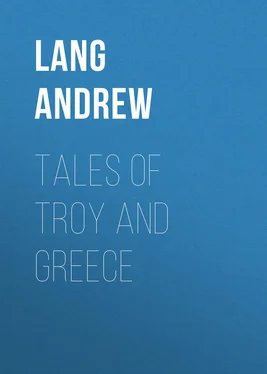Andrew Lang - Tales of Troy and Greece
Здесь есть возможность читать онлайн «Andrew Lang - Tales of Troy and Greece» — ознакомительный отрывок электронной книги совершенно бесплатно, а после прочтения отрывка купить полную версию. В некоторых случаях можно слушать аудио, скачать через торрент в формате fb2 и присутствует краткое содержание. Жанр: foreign_antique, foreign_prose, на английском языке. Описание произведения, (предисловие) а так же отзывы посетителей доступны на портале библиотеки ЛибКат.
- Название:Tales of Troy and Greece
- Автор:
- Жанр:
- Год:неизвестен
- ISBN:нет данных
- Рейтинг книги:5 / 5. Голосов: 1
-
Избранное:Добавить в избранное
- Отзывы:
-
Ваша оценка:
- 100
- 1
- 2
- 3
- 4
- 5
Tales of Troy and Greece: краткое содержание, описание и аннотация
Предлагаем к чтению аннотацию, описание, краткое содержание или предисловие (зависит от того, что написал сам автор книги «Tales of Troy and Greece»). Если вы не нашли необходимую информацию о книге — напишите в комментариях, мы постараемся отыскать её.
Tales of Troy and Greece — читать онлайн ознакомительный отрывок
Ниже представлен текст книги, разбитый по страницам. Система сохранения места последней прочитанной страницы, позволяет с удобством читать онлайн бесплатно книгу «Tales of Troy and Greece», без необходимости каждый раз заново искать на чём Вы остановились. Поставьте закладку, и сможете в любой момент перейти на страницу, на которой закончили чтение.
Интервал:
Закладка:
On hearing this, Agamemnon was very angry. He said that he would send Chryseis home, but that he would take Briseis away from Achilles. Then Achilles was drawing his great sword from the sheath to kill Agamemnon, but even in his anger he knew that this was wrong, so he merely called Agamemnon a greedy coward, 'with face of dog and heart of deer,' and he swore that he and his men would fight no more against the Trojans. Old Nestor tried to make peace, and swords were not drawn, but Briseis was taken away from Achilles, and Ulysses put Chryseis on board of his ship and sailed away with her to her father's town, and gave her up to her father. Then her father prayed to Apollo that the plague might cease, and it did cease – when the Greeks had cleansed their camp, and purified themselves and cast their filth into the sea.
We know how fierce and brave Achilles was, and we may wonder that he did not challenge Agamemnon to fight a duel. But the Greeks never fought duels, and Agamemnon was believed to be chief king by right divine. Achilles went alone to the sea shore when his dear Briseis was led away, and he wept, and called to his mother, the silver-footed lady of the waters. Then she arose from the grey sea, like a mist, and sat down beside her son, and stroked his hair with her hand, and he told her all his sorrows. So she said that she would go up to the dwelling of the Gods, and pray Zeus, the chief of them all, to make the Trojans win a great battle, so that Agamemnon should feel his need of Achilles, and make amends for his insolence, and do him honour.
Thetis kept her promise, and Zeus gave his word that the Trojans should defeat the Greeks. That night Zeus sent a deceitful dream to Agamemnon. The dream took the shape of old Nestor, and said that Zeus would give him victory that day. While he was still asleep, Agamemnon was full of hope that he would instantly take Troy, but, when he woke, he seems not to have been nearly so confident, for in place of putting on his armour, and bidding the Greeks arm themselves, he merely dressed in his robe and mantle, took his sceptre, and went and told the chiefs about his dream. They did not feel much encouraged, so he said that he would try the temper of the army. He would call them together, and propose to return to Greece; but, if the soldiers took him at his word, the other chiefs were to stop them. This was a foolish plan, for the soldiers were wearying for beautiful Greece, and their homes, and wives and children. Therefore, when Agamemnon did as he had said, the whole army rose, like the sea under the west wind, and, with a shout, they rushed to the ships, while the dust blew in clouds from under their feet. Then they began to launch their ships, and it seems that the princes were carried away in the rush, and were as eager as the rest to go home.
But Ulysses only stood in sorrow and anger beside his ship, and never put hand to it, for he felt how disgraceful it was to run away. At last he threw down his mantle, which his herald Eurybates of Ithaca, a round-shouldered, brown, curly-haired man, picked up, and he ran to find Agamemnon, and took his sceptre, a gold-studded staff, like a marshal's baton, and he gently told the chiefs whom he met that they were doing a shameful thing; but he drove the common soldiers back to the place of meeting with the sceptre. They all returned, puzzled and chattering, but one lame, bandy-legged, bald, round-shouldered, impudent fellow, named Thersites, jumped up and made an insolent speech, insulting the princes, and advising the army to run away. Then Ulysses took him and beat him till the blood came, and he sat down, wiping away his tears, and looking so foolish that the whole army laughed at him, and cheered Ulysses when he and Nestor bade them arm and fight. Agamemnon still believed a good deal in his dream, and prayed that he might take Troy that very day, and kill Hector. Thus Ulysses alone saved the army from a cowardly retreat; but for him the ships would have been launched in an hour. But the Greeks armed and advanced in full force, all except Achilles and his friend Patroclus with their two or three thousand men. The Trojans also took heart, knowing that Achilles would not fight, and the armies approached each other. Paris himself, with two spears and a bow, and without armour, walked into the space between the hosts, and challenged any Greek prince to single combat. Menelaus, whose wife Paris had carried away, was as glad as a hungry lion when he finds a stag or a goat, and leaped in armour from his chariot, but Paris turned and slunk away, like a man when he meets a great serpent on a narrow path in the hills. Then Hector rebuked Paris for his cowardice, and Paris was ashamed and offered to end the war by fighting Menelaus. If he himself fell, the Trojans must give up Helen and all her jewels; if Menelaus fell, the Greeks were to return without fair Helen. The Greeks accepted this plan, and both sides disarmed themselves to look on at the fight in comfort, and they meant to take the most solemn oaths to keep peace till the combat was lost and won, and the quarrel settled. Hector sent into Troy for two lambs, which were to be sacrificed when the oaths were taken.
In the meantime Helen of the fair hands was at home working at a great purple tapestry on which she embroidered the battles of the Greeks and Trojans. It was just like the tapestry at Bayeux on which Norman ladies embroidered the battles in the Norman Conquest of England. Helen was very fond of embroidering, like poor Mary, Queen of Scots, when a prisoner in Loch Leven Castle. Probably the work kept both Helen and Mary from thinking of their past lives and their sorrows.
When Helen heard that her husband was to fight Paris, she wept, and threw a shining veil over her head, and with her two bower maidens went to the roof of the gate tower, where king Priam was sitting with the old Trojan chiefs. They saw her and said that it was small blame to fight for so beautiful a lady, and Priam called her 'dear child,' and said, 'I do not blame you, I blame the Gods who brought about this war.' But Helen said that she wished she had died before she left her little daughter and her husband, and her home: 'Alas! shameless me!' Then she told Priam the names of the chief Greek warriors, and of Ulysses, who was shorter by a head than Agamemnon but broader in chest and shoulders. She wondered that she could not see her own two brothers, Castor and Polydeuces, and thought that they kept aloof in shame for her sin; but the green grass covered their graves, for they had both died in battle, far away in Lacedaemon, their own country.
Then the lambs were sacrificed, and the oaths were taken, and Paris put on his brother's armour: helmet, breastplate, shield, and leg-armour. Lots were drawn to decide whether Paris or Menelaus should throw his spear first, and, as Paris won, he threw his spear, but the point was blunted against the shield of Menelaus. But when Menelaus threw his spear it went clean through the shield of Paris, and through the side of his breastplate, but only grazed his robe. Menelaus drew his sword, and rushed in, and smote at the crest of the helmet of Paris, but his bronze blade broke into four pieces. Menelaus caught Paris by the horsehair crest of his helmet, and dragged him towards the Greeks, but the chin-strap broke, and Menelaus turning round threw the helmet into the ranks of the Greeks. But when Menelaus looked again for Paris, with a spear in his hand, he could see him nowhere! The Greeks believed that the beautiful goddess Aphrodite, whom the Romans called Venus, hid him in a thick cloud of darkness and carried him to his own house, where Helen of the fair hands found him and said to him, 'Would that thou hadst perished, conquered by that great warrior who was my lord! Go forth again and challenge him to fight thee face to face.' But Paris had no more desire to fight, and the Goddess threatened Helen, and compelled her to remain with him in Troy, coward as he had proved himself. Yet on other days Paris fought well; it seems that he was afraid of Menelaus because, in his heart, he was ashamed of himself.
Читать дальшеИнтервал:
Закладка:
Похожие книги на «Tales of Troy and Greece»
Представляем Вашему вниманию похожие книги на «Tales of Troy and Greece» списком для выбора. Мы отобрали схожую по названию и смыслу литературу в надежде предоставить читателям больше вариантов отыскать новые, интересные, ещё непрочитанные произведения.
Обсуждение, отзывы о книге «Tales of Troy and Greece» и просто собственные мнения читателей. Оставьте ваши комментарии, напишите, что Вы думаете о произведении, его смысле или главных героях. Укажите что конкретно понравилось, а что нет, и почему Вы так считаете.












